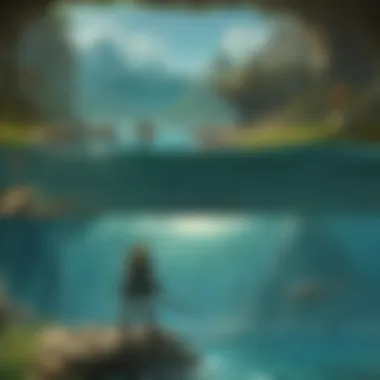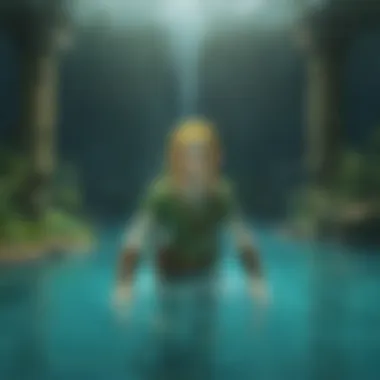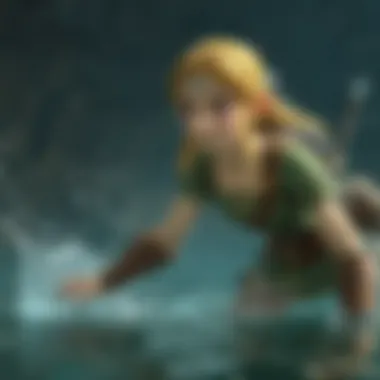Exploring the Fish Out of Water Game in Zelda


Intro
The Fish Out of Water game concept represents a unique gameplay mechanic found within various entries of the Zelda series. This element is not only interesting from a gameplay perspective but it also adds significant depth to the narrative and character development. In this article, we will explore the mechanics of this game feature, tracing its origins and how it has evolved across different titles in the series. Furthermore, we will discuss its impact on players, both casual and dedicated, as well as its emotional and cultural significance.
By examining how this mechanic integrates with the overarching themes of the Zelda universe, we provide a comprehensive guide that illuminates its various aspects. This exploration aims to enhance your understanding of this beloved franchise where adventure, challenge, and story transcend mere gameplay.
Game Reviews
The Fish Out of Water mechanic has been notably utilized in the Legend of Zelda: Ocarina of Time through the character of Zora Link, as well as in The Legend of Zelda: The Wind Waker with explorations of the ocean. Players are often placed in situations where they must adapt to dramatically different environments and challenges. This leads to engaging experiences that require strategic thinking and emotional investment.
When players first encounter this mechanic, it can be disorienting. However, the learning curve is often balanced by innovative gameplay features and quests designed to gradually introduce its intricacies.
Gameplay Features and Mechanics
The core of the Fish Out of Water concept lies in its mechanics. Players often control characters who face challenges outside their natural environment, creating a sense of displacement. Key features include:
- Environmental Challenges: Adapting to new rules and limitations placed on characters due to different settings.
- Increased Complexity: Navigating puzzles that require finesse and creativity.
- Skill Development: Mastering unique abilities that differ from the character's standard moves.
In titles like The Legend of Zelda: Breath of the Wild, exploration plays a pivotal role, allowing players to test their skills in various terrains.
Storyline and Quests
The storyline often revolves around quests that emphasize discovery and overcoming obstacles. Players, through the lens of a character out of their element, experience personal growth and transformation. The interconnectedness of quests emphasizes the need for adaptation and embraces challenges in non-traditional landscapes.
Visuals and Sound Design
Visuals and soundscapes play a crucial role in immersing players in this Fish Out of Water experience. The Zelda series is known for its rich and vibrant graphics. In each new environment, sound design effectively enhances the feeling of being in an unfamiliar and often daunting world.
Comparison with Previous Titles
Analyzing earlier games within the series offers insight into the evolution of this mechanic. Prior titles introduced challenges that required adaptation, but later editions refined these features, creating a more cohesive experience. The shift towards more open-world gameplay in titles like Breath of the Wild offers a strategic examination of how the Fish Out of Water gameplay can be integrated more fluidly into the larger narrative.
Character Analyses
Characters within the Zelda series often undergo significant development as they navigate environments far removed from their comfort zones.
Popular Characters Overview
While Link remains the central figure throughout all Zelda titles, other characters, like Zora Link or even the kingdom's enemies, provide additional dimensions to this mechanic. Their personal struggles often mirror the Fish Out of Water theme, enhancing emotional engagement.
Character Development and Backstories
The challenges faced by characters significantly influence their development. Zora Link's abilities to swim and adapt in Ocarina of Time showcase a personal journey of strength in unfamiliar circumstances. Such narratives resonate strongly with players, inviting empathy and investment.
Role in the Zelda Universe
The Fish Out of Water mechanic reflects on the broader role of characters in the Zelda universe. Each character's journey through struggles leads to them fulfilling their destinies in unique ways.
Fan Theories and Speculations
The discussions among fans frequently explore the implications of character displacement and adaptation. Speculations regarding hidden ties between characters amplified by these mechanics offer an exciting aspect to ongoing engagement within the community.
Lore Discussions
The Fish Out of Water mechanic enriches the lore and mythology within the Zelda universe.
Mythology and Worldbuilding


By providing diverse settings, the titles create a complex world that mirrors various cultural elements. This integration deepens the experience, allowing players to explore rich histories and legends.
Legendary Items and Artifacts
Items like the Zora Scale are integral in advancing the narrative. They empower characters to traverse realms beyond their own, fostering exploration and growth through these scopes.
Link to Real-world Mythologies
The parallels drawn between in-game adventures and real-world mythologies add layers of depth. Players often find relatable themes embedded within the lore.
Timeline Placement and Theories
Understanding the placement of the Fish Out of Water phenomenon within the Zelda timeline provides insight into how these mechanics influence and reflect character arcs and overarching narratives.
Gameplay Strategies
Strategies for navigating the Fish Out of Water mechanics are essential for successful gameplay.
Combat Techniques and Tips
Mastering combat in unfamiliar environments requires adaptability. Players must develop unique techniques suited to distinct terrain types.
Puzzle Solutions and Walkthroughs
Puzzle-solving remains a core component of the experience. Researching potential solutions before attempting the quests enhances success rates.
Collectibles and Side Quest Guides
Engaging with side quests enables a deeper understanding of the narrative and character development, often linking to the Fish Out of Water themes.
Boss Battles Tactics and Strategies
Preparing for boss battles that utilize the Fish Out of Water mechanic entails recognizing their patterns and learning to exploit weaknesses.
The Fish Out of Water mechanic in Zelda represents a fundamental element that extends beyond mere gameplay, offering rich narratives that resonate with players on multiple levels.
Prelude to the Fish Out of Water Game Concept
The 'Fish Out of Water' game concept represents a significant facet of gameplay in many video games, particularly in the Zelda series. This idea reflects situations where characters find themselves in unfamiliar or challenging environments, resulting in unique gameplay dynamics. Understanding this concept helps to appreciate the complexity and richness of the Zelda universe.
Defining the Fish Out of Water Game
At its core, the 'Fish Out of Water' game refers to scenarios where a character must navigate through situations that are outside their normal comfort zone or expertise. This mechanic creates tension and requires players to adapt. In Zelda titles, characters like Link often face obstacles that seem insurmountable. For instance, in The Legend of Zelda: Ocarina of Time, Link must learn to traverse underwater realms where he has limited mobility. This creates a palpable sense of struggle and growth, a hallmark of meaningful game design.
Historical Context in Game Design
Historically, the 'Fish Out of Water' motif has been prevalent in gaming long before the advent of the Zelda series. Early examples can be found in platform games where characters encounter different environments. Game designers have always sought to challenge players by placing them in scenarios that require new skills or methods of thinking.
As gameplay mechanics evolved, the integration of this concept grew more sophisticated. In Zelda, the combination of narrative and gameplay offers rich experiences where Link's adventures often mirror the journey of self-discovery and mastery over new abilities. In the early days, games often relied on simple mechanics. Now, as the medium matures, the desertion of familiarity brings emotional weight, making the player’s journey resonate deeply.
Through the study of this game structure, one can discern a path from simple gameplay mechanics to complex player emotions. This dynamic remains integral to both player engagement and satisfaction.
The Integration of Fish Out of Water Elements in Zelda
The concept of the "Fish Out of Water" game is pivotal in understanding how the Zelda series resonates with players. This trope disorients characters, placing them in unfamiliar settings where they must adapt and navigate challenges outside of their typical environments. Integrating these elements within Zelda not only enhances gameplay but also deepens narratives. By examining how these mechanics contribute to player experience, we grasp the essence of character development and storytelling that Zelda is renowned for.
Overview of Applying This Concept


In the Zelda universe, the Fish Out of Water concept primarily manifests through character interactions, exploration, and puzzle-solving. It introduces obstacles that players must overcome, thereby promoting adaptability. Characters like Link often find themselves in varied circumstances transcending their initial abilities. This diversity creates an engaging dynamic, urging players to think critically and adjust strategies. The importance of this concept lies in its ability to invoke empathy, as players witness characters struggle with transitions, mirroring their own experiences.
Examples from Major Titles
Link's Awakening
In "Link's Awakening," Link wakes up on an unfamiliar island. This scenario encapsulates the Fish Out of Water theme perfectly. Link's lack of knowledge about his surroundings creates a sense of intrigue and encourages exploration. The game's unique feature of dream-based environments plays a crucial role, allowing players to experience whimsical yet challenging puzzles. The vibrant yet strange settings symbolize the dislocation inherent to the Fish Out of Water motif. This imaginative take on the concept makes Link's Awakening advantageous for discussing how disorientation enriches gameplay.
Ocarina of Time
"Ocarina of Time" takes the Fish Out of Water idea to a new level through time travel. Link’s transition from childhood to adulthood creates a stark contrast in mechanics and storytelling. Here, players must navigate the same world under different circumstances. A key characteristic is the need for various tools and abilities as players adapt to these changes. This shift offers insights into not just gameplay, but also Link’s growth as a character. The challenge of mastering new skills fuels player engagement, illustrating how fitting the Fish Out of Water mechanic enhances depth in gameplay.
Breath of the Wild
"Breath of the Wild" further expands this dynamic by allowing Link to explore a vast open world filled with unpredictable elements. The game's open-ended exploration gives players a true sense of being out of their comfort zone. Weather patterns, environmental hazards, and the need to forage for resources compel players to adjust constantly. A unique feature here is the reliance on survival mechanics, which serves as a testament to player adaptability. The sense of vulnerability provided by such mechanics is not just a challenge—it influences how players approach the game emotionally. This immersive aspect makes Breath of the Wild a noteworthy entry in exploring the Fish Out of Water mechanics in Zelda.
Mechanics of the Fish Out of Water Game
In the context of the Zelda universe, the mechanics of the Fish Out of Water game concept play a crucial role in enhancing gameplay. This unique mechanic references situations where characters are thrust into unfamiliar settings, requiring players to navigate challenges that test adaptability and resourcefulness. Such scenarios are not merely a design choice but serve a larger narrative function. They facilitate character development and encourage players to engage with the environment in innovative ways.
Gameplay Dynamics
The gameplay dynamics associated with the Fish Out of Water concept are multifaceted. Players often find themselves controlling characters in situations that sharply contrast with their familiar abilities or surroundings. For example, Link’s traversal through varied terrains and distinct atmospheres showcases this mechanic effectively. These dynamics influence how players approach challenges and interact with the game world.
Moreover, the gameplay often involves a shift in mechanics that forces players to rethink their strategies. Understanding new rules, adapting to varying environmental conditions, and recognizing the significance of different items become key aspects. Moments where players must master these dynamics to succeed elevate the overall gaming experience.
Challenges Presented to Players
The challenges that arise from the Fish Out of Water mechanic are intentionally designed to push players beyond their comfort zones. Some common challenges include:
- Navigation Issues: Characters may lack skills or abilities that they typically have in familiar settings, complicating movement and exploration.
- Resource Management: Players may need to modify how they use items, whether in limited supply or requiring new methods of application.
- Adapting Skills: Players often face obstacles that require them to rethink their usual approaches to problem-solving.
Such challenges not only test the players' skills but also encourage them to engage more deeply with the game’s narrative. By confronting and overcoming these obstacles, players can enjoy a richer gaming experience in the Zelda franchise.
Rewards and Progression
The Fish Out of Water mechanic provides substantial rewards and progression opportunities. Upon overcoming the initial hurdles, players typically uncover hidden elements of the narrative or access new gameplay features. As they progress, they often unlock new abilities or acquire unique items that were initially out of reach. The following points highlight this aspect:
- Character Growth: Players see significant development not only in their skills but also in the characters they control.
- Narrative Depth: Successfully navigating through these scenarios usually leads to deeper storylines and character arcs.
- Enhanced Game Mechanics: Later stages often introduce hybrid mechanics that combine familiar gameplay with the new challenges.
Character Development Through Fish Out of Water Experiences
The concept of the "Fish Out of Water" experience is pivotal in enhancing character development within the Zelda series. It propels characters into unfamiliar situations that challenge their abilities and understanding. In doing so, it serves both narrative and gameplay purposes, enabling richer storytelling by allowing for personal growth and transformation. The themes of adaptation and change are deeply embedded in these experiences, which resonate throughout the gameplay.
Character Arcs and Growth
In the context of the Zelda series, characters often find themselves in roles where they must adapt quickly to new environments or circumstances. This experience not only fosters individual growth but also shapes the overarching narrative. Link, for instance, frequently begins his journey in a state of ignorance or naiveté, eventually evolving into a hero through various trials. Each encounter with new challenges enriches his character arc, cultivating qualities such as courage, resilience, and empathy.
Throughout titles like "Ocarina of Time" and "Breath of the Wild", players witness Link’s struggle and desire to learn from his environment. Players obtain a unique perspective on how these experiences mold his character. The moments of uncertainty, misstep, or outright failure contribute significantly to his maturation. This growth often mirrors the players’ journey, instilling a sense of accomplishment upon overcoming challenges together with Link.
"The journey of self-discovery emerges from the array of challenges presented. It transforms the player’s experience into something deeply personal, bridging the gap between character and player."
Interactions with Other Characters
In the Fish Out of Water scenarios, interactions with other characters are also influential in promoting growth. Characters like Princess Zelda often act as catalysts, guiding Link through his experiences. Their relationships highlight themes of collaboration, trust, and the importance of understanding differing perspectives. For example, in "The Legend of Zelda: Skyward Sword", Link's interactions with Fi enhance his knowledge and abilities, allowing him to overcome significant obstacles.
Likewise, characters such as Tetra in "The Legend of Zelda: The Wind Waker" present contrasting lifestyles and outlooks, which push Link to adapt. This dynamic reflects the vital necessity of social connections and the wisdom gained from others during one’s transformative journey. Ultimately, these interactions serve to deepen the narrative, illustrating how companionship and dialogue enrich character development during uncomfortable and unfamiliar phases.


Cultural Implications of the Fish Out of Water Motif
The Fish Out of Water motif plays a significant role in the Zelda franchise, acting as a narrative and gameplay catalyst. This motif embodies the struggle of characters who find themselves in unfamiliar settings or circumstances. Understanding its cultural implications provide insight into how it resonates with themes of identity, adaptation, and growth. The essence of being a fish out of water relates directly to a player’s journey through challenges, pushing them to confront not only gameplay mechanics but also deeper existential themes.
The idea of navigating through environments where traditional rules do not apply can lead to reflections on societal norms. Players engage with scenarios that force them to rethink their strategies. This reflection often transcends gameplay, prompting discussions on broader concepts like belonging and self-acceptance among communities.
Moreover, the integration of this motif in Zelda highlights the franchise's commitment to storytelling. It deepens character arcs, revealing vulnerabilities and strengths in the process. As players embody Link, the experiences of being out of his element foster a connection to the character's personal growth.
"Characters evolve in their unfamiliar worlds, showing triumph over adversity that speaks to universal human experiences."
Symbolism in the Zelda Universe
Within the Zelda universe, the Fish Out of Water motif carries rich symbolism. Each instance where the protagonist faces dislocation often corresponds to a pivotal moment of transformation. One prominent example is seen in the spirit of the Deku Tree in Ocarina of Time, where Link must adapt to different forms reflecting his own lack of experience and understanding in the vast world of Hyrule.
This symbolism extends to the environmental design as well. The landscapes of Hyrule, with their varied ecosystems, facilitate these disjointed departures. The contrasts between lush fields and treacherous dungeons mirror the emotional challenges faced by the characters, emphasizing their journeys. Players can draw parallels with their own lives, where the trials faced in foreign circumstances prompt innovation and growth.
Comparison with Other Game Genres
When comparing the Fish Out of Water motif in Zelda to other game genres, such as role-playing games or simulation, its unique impact becomes clear. In many RPGs, character development often revolves around leveling up and acquiring skills. However, Zelda integrates the out-of-water experience into the core design, where adaptation is not just part of character growth but the essence of gameplay.
In simulation games, players often have predefined roles and responsibilities in familiar settings. In contrast, Zelda challenges players to embrace uncertainty. This creates a distinctive interaction where failure is not merely a setback but a teacher. The willingness to explore the unfamiliar can lead to fascinating discoveries, and it cultivates a dynamic relationship between the player and the game world.
In summary, the cultural implications of the Fish Out of Water motif in the Zelda series reveal a multifaceted relationship between gameplay, narrative structure, and character exploration. It offers profound insights into the human condition, making Zelda not just a game but a means to reflect on growth in unfamiliar terrains.
Player Reception and Engagement
The concept of player reception and engagement is crucial when discussing the Fish Out of Water game mechanics in the Zelda series. Understanding how players perceive and react to these mechanics can provide valuable insights into their overall gaming experience. Players' responses significantly influence game design and development, shaping future titles within the franchise.
Responses from the Gaming Community
The community around Zelda has always been vocal about their experiences, particularly regarding gameplay elements that deviate from the norm. The Fish Out of Water mechanics often evoke strong reactions. Many players appreciate the fresh challenges presented by these mechanics, as they break the conventions typically established in video games.
For instance, when Link finds himself in unfamiliar settings, such as transitioning from land to various aquatic worlds, players often express excitement. They value the way these moments force characters to adapt to new environments, which mirrors their own challenges as gamers.
Feedback from online platforms such as reddit.com highlights a spectrum of opinions. Some players enjoy these mechanics for their creativity, while others express frustration when the adaptation proves difficult or counter-intuitive. The diversity of opinions indicates not just engagement but also a deeper investment in the mechanics.
Critiques and Discussion Points
Critical discourse around the Fish Out of Water mechanics can shed light on the balance between creativity and frustration in game design. Many players praise the depth and unique instances where characters, particularly Link, undergo significant development through these experiences. However, some critiques focus on pacing and difficulty spikes created by these transitions.
Players often point out that when the game introduces sudden shifts in mechanics, it can disrupt the flow of play. The need for complete adaptation in such moments may lead to disconnection. This aspect must be carefully considered by developers to maintain engagement without alienating players.
Furthermore, discussions frequently touch on the emotional weight these mechanics carry. While they can enhance the narrative, if not executed well, they risk becoming mere obstacles rather than meaningful experiences. Thus, the reception of these mechanics greatly affects not only player enjoyment but also the overall narrative structure of the game.
"Understanding player feedback is vital. It influences how mechanics evolve and improve with each iteration of the series."
Addressing player concerns while maximizing engagement is a challenge that developers face. Meaningful use of the Fish Out of Water mechanics hinges on not just how they affect gameplay, but also how they resonate with the community.
Epilogue
The conclusion of this article emphasizes the vital role that the 'Fish Out of Water' game mechanic plays within the Zelda series. This mechanic not only enhances gameplay but also deeply influences story and character development. By placing players in unfamiliar situations, it encourages adaptability and problem-solving, which are key skills in both gameplay and life.
Summarizing Key Insights
Throughout the exploration of the 'Fish Out of Water' mechanic, several key insights emerge:
- Player Experience: This mechanic creates unique experiences for players by thrusting them into scenarios that demand quick thinking and new strategies. The challenge heightens engagement.
- Character Development: Characters in the Zelda series often grow in unexpected ways through these experiences. The interplay between character strength and vulnerability adds layers to their narratives.
- Cultural Reflection: The mechanic reflects broader cultural themes, such as feelings of alienation and the journey of self-discovery. These themes resonate with a wide audience, enhancing the relatability of the series.
Future of the Fish Out of Water Game Mechanic in Zelda
Looking towards the future, the 'Fish Out of Water' mechanic is likely to evolve further within upcoming Zelda titles. As technology and storytelling techniques grow, this mechanic may integrate even more sophisticated elements such as:
- Dynamic Environments: Future games might employ AI to create environments that respond in real-time to player actions, enhancing the sense of being out of one’s element.
- Enhanced Character Interactions: There could be deeper relationships that develop based on shared or diverging experiences. This may give players stronger emotional ties to both characters and the overall story.
- Varied Gameplay Styles: New iterations might introduce a wider range of gameplay styles that rely on this mechanic, allowing players to experience the 'out of water' feeling in even more dimensions.







